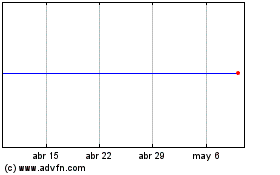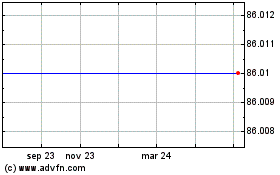United Tech Rebuffs Honeywell Tie-Up on Antitrust Grounds -- 3rd Update
22 Febrero 2016 - 5:44PM
Noticias Dow Jones
By Ted Mann and Dana Mattioli
Honeywell Inc. recently approached rival United Technologies
Inc. about a combination of the industrial giants but was rebuffed
amid concerns such a transaction wouldn't pass antitrust muster,
according to people familiar with the matter.
The proposed transaction would combine conglomerates, which are
each worth more than $70 billion, that make everything from
elevators and thermostats to jet engines and landing gear. But
given the overlap between their business units, especially in
aerospace, such a transaction would face steep regulatory hurdles.
The two companies together employ more than 300,000 people.
Exploratory talks have been occurring on-and-off for roughly a
year, according to one of the people, but the two rivals have been
unable to agree on key aspects of any proposal, including how
viable a combination would be and who would run the merged entity.
United Technologies believes there is little to no chance that a
deal would be approved by antitrust regulators, according to this
person.
News of the talks was earlier reported by CNBC. Shares of
Honeywell, which had risen 2.5% over the past year through Friday,
closed down almost 1.9% on Monday. Shares of United Technologies,
which had fallen about 28% over the past year through Friday,
closed almost 4.8% higher Monday.
The Honeywell overture comes after significant concentration in
the aerospace industry, including United Technologies' $16 billion
acquisition of Goodrich Corp., a maker of aircraft brakes and
landing gear, in 2011.
United Technologies generates about half of its $56 billion in
annual sales from its Pratt & Whitney engines and other
aerospace work. Honeywell gets about $15 billion, or nearly half,
of its annual revenue from avionics and other aerospace parts.
"There is no chance the government will give them a pass," said
Erik Gordon, a professor at the University of Michigan's business
school. Regulators would be especially concerned with the effects
on Boeing Co. and Airbus Group SE, who would be reliant on a single
combined company for many of the systems and devices they
incorporate into new planes, he said.
United Technologies and Honeywell identify one another as key
competitors in their filings to the Securities and Exchange
Commission, along with General Electric Co. But that didn't stop
them from attempting to merge more than a decade ago.
The companies have been "nibbling at each other for years," Mr.
Gordon said.
Under previous leadership in 2000, Honeywell proposed a merger
with United Technologies that would have had the latter company in
the role of the buyer. But GE jumped in with a higher offer,
striking a $40 billion deal to acquire Honeywell. That deal, which
would have been the largest in GE's history, was blocked in 2001 by
European antitrust regulators.
Honeywell and United Technologies have been on divergent
trajectories over the past two years. Although United Technologies
is about 50% larger than Honeywell, its stock market value is
lower.
Honeywell has been a Wall Street darling, rising more than 80%
over the past five years, as Chief Executive David Cote and his
team have pursued a series of relatively small acquisitions to
build out the conglomerate's offerings. The company's product lines
now range from thermostats and airplane radar to oil refining
catalysts and rubber gloves and boots.
United Technologies has staggered through a tumultuous 24 months
that included the abrupt departure of its former CEO in 2014.
Current CEO Gregory Hayes has tried to reassure investors that
major bets like a $10 billion investment to develop a new family of
jet engines and expansion overseas to capitalize on urbanization in
Asia will pay off in the long run.
In recent months, the company has stumbled. A new logistics
center for aircraft engine parts was mired with delays, United
Technologies missed an earnings target thanks to a poor estimate in
its aerospace systems business, and it has been weighed down by
slowing growth in China, which was once a bright spot for the
company's Otis elevators.
A big deal would be a capstone to Mr. Cote's 14-year leadership
of Honeywell. The company's philosophy is to use its strong
positions in niche industries to grow into attractive adjacent
markets -- the route that took Honeywell from fire safety systems
to gas detection and into the personal protective equipment that it
now sells to utility line workers and firefighters.
But investors have wondered when Mr. Cote would attempt a bigger
deal, and Honeywell executives have made no secret of their
interest to bite off something bigger. "The larger M&A
category's interesting," Chief Financial Officer Tom Szlosek told
an investor conference last week.
United Technologies, meanwhile, has focused on slimming down.
Mr. Hayes struck a deal last year to sell the company's Sikorsky
helicopter business to Lockheed Martin Corp. for $9 billion. He has
promised to spend $16 billion on share buybacks and outlined a
three-year cost-cutting program to boost profits.
Write to Ted Mann at ted.mann@wsj.com and Dana Mattioli at
dana.mattioli@wsj.com
(END) Dow Jones Newswires
February 22, 2016 18:29 ET (23:29 GMT)
Copyright (c) 2016 Dow Jones & Company, Inc.
United Technologies (NYSE:UTX)
Gráfica de Acción Histórica
De Sep 2024 a Oct 2024

United Technologies (NYSE:UTX)
Gráfica de Acción Histórica
De Oct 2023 a Oct 2024
